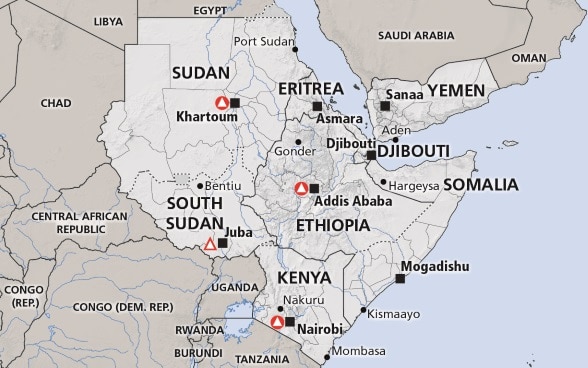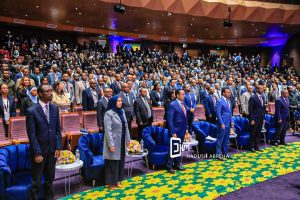
During the 2019 World Economic Forum which was held in Davos Switzerland, Prime Minister Abiy Ahmed said that regional integration and trade will be crucial to the future of the African continent to go beyond the production of primary commodities and accelerate development.
Stating that neighbors that engage in intimate rule-based trade and economic integrations are unlikely to resort to conflict, the Prime Minister noted, “That is why we believe integration must be viewed not just as an economic project but also as crucial element to securing peace and reconciliation in the Horn of Africa.
As part of the current reform underway in the country, Prime Minister Abiy Ahmed’s government has been taking various macroeconomic measures to promote economic integration among East African countries. In his recent journey to Europe, the premier made successful diplomatic dialogue with his counterparts and potential investors, which among others focused on economic issues at the regional level.
For instance, the Premier held successful discussions with Italian Prime Minister Antonio Conte where the latter promised to support the feasibility study for a railway line that connects Ethiopia with Eritrea’s Port of Massawa. Dr. Eyob Tesfaye, an expert who specializes in macro-economic issues, says through economic integration and adopting similar policies to promote regional trade and investment, neighboring economies can make the best out of their respective comparative advantages.
In addition regional economic integration and trade minimizes transaction cost, and hence help countries and their respective citizens to create wealth. Regional economic integration also assists countries to root out trade barriers among them. It would allow the establishment of free trade zone and joint customs association or customs unions.
Hence, the process would facilitate the creation of a single regional market and hence economic unity by adopting an identical monetary and fiscal policy, Eyob indicates. At the end of the day, the major goal of economic integration is the joint accumulation of wealth, as to him. If you take Ethiopia, its population has now reached 100 million.
This is a huge market for neighboring countries and an incentive to increase their productivity,” he says adding, “On the other hand, Ethiopia is a landlocked country. But its neighbors have ports. Thus, the development of regional infrastructure linkage reduces logistics service barriers and transaction cost to help both the economies of Ethiopia and its neighbors.” But, Eyob advises the economic integration process should be applied phase by phase.
Though economic integration is a brilliant idea, its implementation, particularly in the case of East Africa, needs greater care as it has to do with key policy issues, he says. As it is a journey that takes countries to [economic] unity, it has to be a gradual process. He also adds that as poverty is also a regional reality, economic integration should be sought as a solution to reducing poverty at the regional level.
He also agrees with Prime Minister Abiy’s idea that regional economic integration would synergize the effort to ensure peace and stability. “It is at the heart of regional peace and stability,” he says. Without a doubt, infrastructure development should be sought as the foundation for economic integration. For instance, Ethiopia has been aspiring to increase its power infrastructure by taking power export to neighboring countries into consideration.
This is also one of the instruments of accelerating industrialization. “Over the past years, governments were not thinking about economic integration. Even, they have not been able to form consistent diplomatic relations. Hence, economic integration has to be undertaken step by step. And the initiative needs to be accepted not only by governments but also by the people.
Citizens should get benefit out of the multilateral relations.” For Dr. Belay Fille, an economist at Civil Service University, the tendency of many African countries including Ethiopia to engage in commercial activities with their African counterparts is poor. Instead, they opt to import goods from Asia, Europe or the likes. “So each African country should conduct an in-depth analysis of economic integration to further deliberate jointly on the issue in regional organizations such as COMESA, ECOWAS, and IGAD etc,” he says.
“Instead of competing with one another by producing identical products and contributing for price fall, it is imperative to initiate economic collaborations to have a monopoly over the goods they produce.” The ongoing initiative to develop regional economic integration does not have to be a onetime agenda; it has to be sustainable, Belay says. Governments have to come up with various initiatives to encourage interactions.
“For instance, the visa on arrival service is a notable example here which would facilitate the people to people interaction and regional tourism development.” On the other hand, he went on saying that African countries need to look for sources of foreign direct investment within the continent. “In trade, distance matters most, and this is one advantage to pursue economic integration. Besides, countries that produce similar items need to form some sort of integration so that to jointly influence the market.” Dr. Belay says, in terms of infrastructure development, the major challenge for East African countries is the issue of finance.
This is mainly due to the fact that the return might be gained in the long run. Peace and security are vital to economic integration. On the other hand, economic integration is also a vital instrument to ensure regional peace and security. If countries are integrated economically, it is highly likely that they would tend to work for the peace and security of each other.
In the African continent in general, and east African in particular, the state of economic integration is still weak, Belay says. “African countries are not importing goods from their neighbors. So my question is what is the point of discussing African problems by the leaders unless they come up with a mechanism to promote economic integration and regional trade?”
The Ethiopian Herald February 7/2019
BY GIRMACHEW GASHAW





